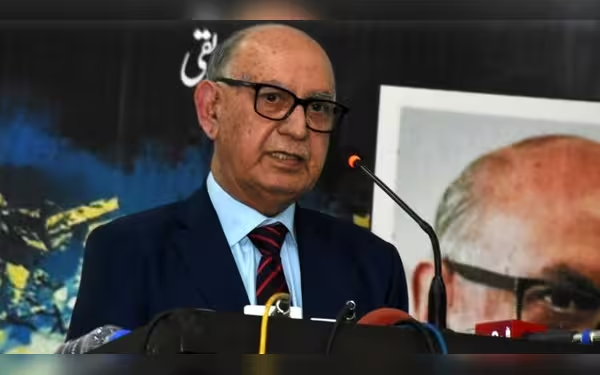Friday, October 4, 2024 08:22 AM
Constitutional Amendment Adjusted with Maulana Fazlur Rehman's Consent
- Irfan Siddiqui discusses constitutional amendment with Maulana Fazlur Rehman.
- Amendment aims to address judicial matters in Pakistan.
- Government open to involving PTI in discussions.
 Image Credits: geo
Image Credits: geoIrfan Siddiqui reveals constitutional amendment adjusted with Maulana Fazlur Rehman's consent, addressing key judicial matters in Pakistan.
In a significant development regarding Pakistan's constitutional framework, Senator Irfan Siddiqui of the Pakistan Muslim League-Nawaz (PML-N) has revealed that the proposed constitutional amendment has been adjusted with the consent of Maulana Fazlur Rehman, the chief of Jamiat Ulema-e-Islam-Fazl (JUI-F). This amendment is crucial as it aims to address various judicial matters within the country, and the involvement of key political figures indicates the importance of consensus in the legislative process.
During a recent appearance on the Geo News program "Aaj Shahzeb Khanzada Kay Sath," Siddiqui shared insights from his meeting with Maulana Fazlur Rehman in Islamabad. Although the primary agenda of their discussion was not the constitutional amendment, it inevitably came up. Siddiqui noted, "Maulana Fazlur Rahman informed me about his reservations regarding the amendment. He has no objection on formation of the constitutional court as well as the amendment’s basic points." This statement highlights a collaborative approach to governance, where differing opinions are acknowledged and addressed.
When pressed for a timeline regarding when the amendment would be presented in parliament, Siddiqui stated that he could not provide a definitive answer at this moment. However, he expressed optimism that clarity would emerge within a week or ten days. He also mentioned that if Maulana Fazlur Rehman wished to involve the Pakistan Tehreek-e-Insaf (PTI) in the discussions, the government would not oppose such a move. This openness to collaboration reflects a desire for unity among political factions, especially in a time of political uncertainty.
Addressing concerns about former Prime Minister Nawaz Sharif's recent foreign visit, Siddiqui clarified that it was originally planned for medical reasons but had been postponed due to the current political climate. He emphasized that even if Sharif were to travel abroad, it would only be for a short duration of 8 to 10 days.
In his interactions with the media, Siddiqui reiterated that Maulana Fazlur Rehman does not seek any provisions in the proposed constitutional package that would contravene the constitution. "He only has reservations on a few minor matters which are being looked into by our team," he stated, indicating that the government is actively working to address these concerns.
Furthermore, Siddiqui dismissed rumors regarding the government's intention to extend the tenure of Chief Justice of Pakistan (CJP) Qazi Faez Isa, asserting that the proposed amendments are not tailored to any individual. He remarked, "Any constitutional amendment has nothing to do with Chief Justice of Pakistan (CJP) Qazi Faez Isa or Justice Mansoor Ali Shah," thereby reinforcing the notion that the amendments are intended for broader judicial reform rather than personal interests.
The backdrop of this constitutional amendment is marked by speculation surrounding the potential extension of CJP Isa's tenure, which is set to conclude this month. The PML-N, despite having the backing of allies like the Pakistan Peoples Party (PPP), has faced challenges in securing the necessary votes in parliament, particularly after JUI-F withheld its support. Siddiqui acknowledged that the ruling coalition is short of 13 votes in the National Assembly and nine in the Senate, emphasizing the need for a two-thirds majority to pass the amendment.
The ongoing discussions surrounding the constitutional amendment reflect the intricate dynamics of Pakistan's political landscape. The willingness of key leaders to engage in dialogue and address each other's concerns is a positive sign for the future of governance in the country. As the political environment continues to evolve, the outcome of these discussions will undoubtedly shape the judicial framework and the broader political narrative in Pakistan.













